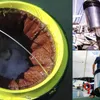These algae tiles developed by an Indian architect can absorb pollutants from water
The algae tile, named Indus, has a modular bioreactor wall system for cleaning water through a phenomenon called bioremediation.
We are seeing the fallout of excessive pollution and its consequences in the form of climate change. Oil spills and plastics have rendered our oceans uninhabitable for plenty of creatures, with dead fish and other forms of life washing up on shores regularly. It is time we took the matter seriously and found ways to save our planet from our ill-advised actions.
One such person who is doing her bit is architect Shneel Malik, who has built tiles, called Indus, out of algae to suck pollutants and toxins out of water.

Shneel Malik (Image: Twitter)
A Bartlett doctoral candidate at the University College London, and hailing from New Delhi, Shneel harnesses these single-celled, non-flowering organisms found in the ocean floor to remove pollutants from the environment through a phenomenon known as 'bioremediation'.
According to Green Magazine, the University College London has initiated a project that will have an inter-disciplinary approach to address water pollution. The project will execute the solution in the form of Indus, a tile-based modular bioreactor wall system for cleaning water through bioremediation.
“The tiles and the entire system are designed to be fabricated using locally available materials and techniques, thereby reducing the capital expenditure significantly,” Shneel told Green Magazine.

The prototype of the structure (Image: Outdoor Design Source)
“These tiles can either be installed on existing walls and roofs of the small-scale artisanal industries, wherein Indus might cater to the single unit only. But if we wish to scale up and use it on a community level, a standalone wooden batten structure can be installed which then hold[s] the tiles,” she added.
These tiles are designed like a leaf that allows water to flow over its vein-like channels that contain the algae. These algae are suspended within a biological scaffold of a seaweed-based hydrogel that keeps the algae alive and is completely recyclable and biodegradable.
These tiles can also be built easily, Shneel told Outdoor Design, adding that the materials required to make the algae can be supplied in powdered form, which can be cooked to make the hydrogel for the tiles.
She explained,
“At some point, the hydrogel will become saturated and will need to be replaced. The exact timing depends on the number of pollutants in the water, but we have made several formulations that are stable for months.”

The leaf structure (Image: Green Magazine)
After a certain amount of time, the algae are replaced with fresh batches, and the tiles are reused and refilled. For easy maintenance and adaptation, these tiles are attached next to each other through half-lap joints, and can be removed individually without breaking the entire structure.
“Through our site visits, we realised that the artisan workers had no space available for westernised high-tech water treatment solutions. Neither did they have the economic capacity to get additional support. So, we needed a system that was spatially compatible and could be constructed and maintained by them”, Shneel told Outdoor Design.
Once the project is rolled out, these tiles that are now moulded via templates, could be custom-made via Bio-ID Lab, which would have different channels to correspond to different contaminants.
(Edited by Suman Singh)
Do you have an interesting story to share? Please write to us at [email protected]. To stay updated with more positive news, please connect with us on Facebook and Twitter.









